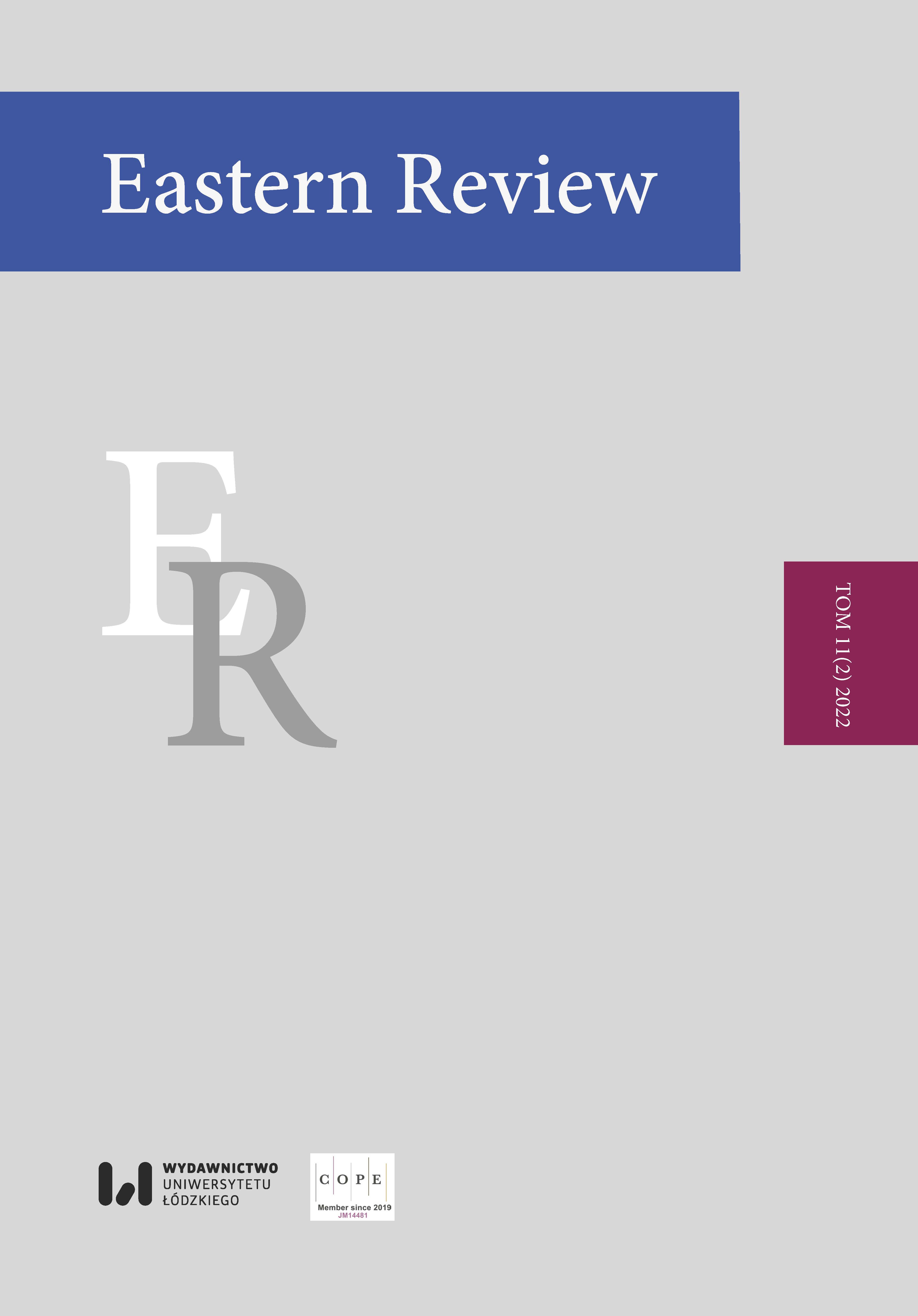Role of military cooperation in Vietnam-Russia relations
DOI:
https://doi.org/10.18778/1427-9657.11.16Keywords:
Russia, Vietnam, Russian-Vietnamese relations, military cooperation, arms tradeAbstract
The primary purpose of this article is the analysis of the evolution of bilateral relations between the Socialist Republic of Vietnam (SRV) and the Russian Federation in the field of military cooperation. It gives answers to following research questions: 1) what is the role of defence collaboration in bilateral ties, 2) what are the most essential elements of Russia-Vietnam military relations, 3) what are the common reasons/ incentives for developing links regarding arms trade, 4) do the Russian annexation of Crimea in 2014 and invasion of Ukraine in 2022 change goals of Vietnamese politics towards Moscow, 5) How do Chinese and US factor affect military cooperation between Russia and Vietnam? The theses of this paper assume that: 1) the government in Hanoi maintains friendly relations with Moscow on the political level in the face of the conflict in Ukraine and continues military cooperation, however Russian arms exports to Vietnam has declined, 2) Vietnam diversifies weapon trade partners expanding cooperation with Israel, Belarus, US and South Korea, but Russia still remains crucial arms importer for Hanoi.
The analysis is focused mainly on the situation from 2002 to the present, and intends to examine the evolution of military cooperation between Hanoi and Moscow after the signing of the Declaration on Strategic Partnership. The article includes a short overview of Russia-Vietnam relations emphasizing its strong historical background. Paper is also focused on important arms trade contracts, agreements on military cooperation, includes statistics published by Stockholm International Peace Research Institute (SIPRI) to show the scale of collaboration, and points out major challenges for future cooperation.
References
Acharya, A. 1988. The United States Versus the USSR in the Pacific: Trends in the Military Balance. Contemporary Southeast Asia 9(4), March, pp. 282–299. https://doi.org/10.1355/CS9-4C
Google Scholar
DOI: https://doi.org/10.1355/CS9-4C
Baev, P.K., Tønnesson, S. 2015. Can Russia keep its special ties with Vietnam while moving closer and closer to China? International Area Studies Review 18(3), pp. 312–325. https://doi.org/10.1177/2233865915596709
Google Scholar
DOI: https://doi.org/10.1177/2233865915596709
Brunnstrom, D. 2015. Exclusive: U.S. asks Vietnam to stop helping Russian bomber flights. Reuters. 11.03.2015, https://www.reuters.com/article/us-usa-vietnam-russia-exclusive-idUSKBN0M71NA20150311 (accessed 2.08.2022).
Google Scholar
Buszyński, L. 2006. Russia and Southeast Asia: A New Relationship. Contemporary Southeast Asia 28 (2), pp. 276–296. https://doi.org/10.1355/CS28-2E
Google Scholar
DOI: https://doi.org/10.1355/CS28-2E
Cranny-Evans, D. 2019. Russia completes delivery of T-90S/SK tanks to Vietnam. Janes. 28.03.2019, https://www.janes.com/defence-news/news-detail/russia-completes-delivery-of-t-90ssk-tanks-to-vietnam (acces-sed 15.08.2022).
Google Scholar
Dror, O. 2022. Weaponising Ho Chi Minh in Vietnamese Discourse on the War in Ukraine. Fulcrum. Analysis on Sou-theast Asia. 17.06.2022, https://fulcrum.sg/weaponising-ho-chi-minh-in-vietnamese-discourse-on-the-war-in-ukraine/ (accessed 10.07.2022).
Google Scholar
Goh, E. 2005. Meeting the China challenge: The US in Southeast Asian regional security strategies. Policy Studies 16. Washington: East-West Center.
Google Scholar
Grevatt, J. 2021. Vietnam, Russia sign military-technical deal. Janes. 2.12.2021, https://www.janes.com/defence-news/news-detail/vietnam-russia-sign-military-technical-deal (accessed 7.08.2022).
Google Scholar
Grossman, D. 2022. Why Vietnam Might Want to Reconsider its Russia Policy, ISEAS Yusof Ishak Institute. Perspective 50, 11 May, pp. 1–9.
Google Scholar
Karwowski, M. 2009. Polityka zagraniczna Socjalistycznej Republiki Wietnamu w pierwszej dekadzie XXI wieku. Stan obecny i perspektywy. Azja-Pacyfik 12, pp. 100–114. https://doi.org/10.15804/ap200904
Google Scholar
DOI: https://doi.org/10.15804/ap200904
Karwowski, M. 2010. Wielki zwrot. Polityka zagraniczna Wietnamu w okresie odnowy (doi moi). Forum Politologiczne 11, pp. 419–451.
Google Scholar
Kozub-Karkut, M. 2014. Realizm neoklasyczny – główne założenia i możliwości. In: E. Haliżak, J. Czaputowicz (eds.). Teoria realizmu w nauce o stosunkach międzynarodowych. Założenia i zastosowania badawcze. Warszawa: Wydawnictwo Rambler.
Google Scholar
Kuik, Cheng-Chwee. 2008. The Essence of Hedging: Malaysia and Singapore’s Response to a Rising China. Contemporary Southeast Asia: A Journal of International and Strategic Affairs 30, pp. 159–185. https://doi.org/10.1355/CS30-2A
Google Scholar
DOI: https://doi.org/10.1355/CS30-2A
Lê Hồng Hiệp. 2013. Defence cooperation underpins Vietnam–Russia push for renewed economic cooperation. East Asia Forum. 13.11.2013, https://www.eastasiaforum.org/2013/11/13/defence-cooperation-underpins-vietnam-russia-push-for-renewed-economic-cooperation/ (accessed 12.08.2022).
Google Scholar
Lê Hồng Hiệp. 2022. Will Vietnam Be Able to Wean Itself Off Russian Arms? Fulcrum. Analysis on Southeast Asia. 4.04.2022, https://fulcrum.sg/will-vietnam-be-able-to-wean-itself-off-russian-arms/ (accessed 1.08.2022).
Google Scholar
Macias, A. 2020. U.S. sanctions Turkey over purchase of Russian S-400 missile system, CNBC. 14.12.2020, https://www.cnbc.com/2020/12/14/us-sanctions-turkey-over-russian-s400.html (accessed 7.08.2022).
Google Scholar
Mosyakov, D. 2014. The role of the USSR in repelling China’s aggression against Vietnam in 1979. South-East Asia: Current Issues 12, pp. 128–135.
Google Scholar
Nguyễn Hồng Hải. 2022. Parsing the News About the Vietnam-Russia Joint Military Drills. The Diplomat. 12.05.2022, https://thediplomat.com/2022/05/parsing-the-news-about-the-vietnam-russia-joint-military-drills/ (accessed 5.08.2022).
Google Scholar
Nguyễn Thế Phương. 2015. What Should the United States Do about Cam Ranh Bay and Russia’s Place in Vietnam? CSIS Asia Program. 16.03.2015, http://www.cogitasia.com/what-should-the-united-states-do-about-cam-ranh-bay-and-russias-place-in-vietnam/ (accessed 11.08.2022).
Google Scholar
Nguyễn Thế Phương. 2021. Why is Vietnam’s Military Modernisation Slowing? ISEAS Yusof Ishak Institute. Perspective 96, 22 July, pp. 1–9.
Google Scholar
Phan Xuân Dũng. 2022. Russian Invasion of Ukraine Poses Geopolitical Quandaries for Vietnam. Fulcrum. Analysis on Southeast Asia. 2.03.2022, https://fulcrum.sg/russian-invasion-of-ukraine-poses-geopolitical-quandaries-for-vietnam/ (accessed 10.08.2022).
Google Scholar
Pietrasiak, M. 2002, Stosunki wietnamsko-rosyjskie w okresie modernizacji systemu społeczno-ekonomicznego Wietnamu. Stosunki Międzynarodowe 1–2(25), pp. 189–202.
Google Scholar
Rogozińska, A., Olech, A. 2020. The Russian Federation’s military bases abroad. Warszawa: Institute of New Europe.
Google Scholar
Stockholm International Peace Research Institute. 2020. SIPRI databases/ SIPRI Arms Transfers Database, https://www.sipri.org/databases (accessed 3.08.2022).
Google Scholar
Storey, I. 2021. Russia’s Defence Diplomacy in Southeast Asia: A Tenuous Lead in Arms Sales but Lagging in Other Areas. ISEAS Yusof Ishak Institute. Perspective 13, 18 March, pp. 1–16.
Google Scholar
Storey, L. 2022. The Russia-Ukraine War and its Potential Impact on Russia’s Arms Sales to Southeast Asia, ISEAS Yusof Ishak Institute. Perspective 47, 5 May, pp. 1–11.
Google Scholar
Storey, I., Thayer, C. 2002. Cam Ranh Bay: Past Imperfect, Future Conditional, Contemporary Southeast Asia 23 (3) December, pp. 452–473. https://doi.org/10.1355/CS23-3D
Google Scholar
DOI: https://doi.org/10.1355/CS23-3D
Strangio, S. 2022. Are Russian Arms Exports to Southeast Asia a Thing of the Past? The Diplomat. 9.05.2022, https://thediplomat.com/2022/05/are-russian-arms-exports-to-southeast-asia-a-thing-of-the-past/ (accessed 3.08.2022).
Google Scholar
Thayer, C. 2013. The Bear is Back: Russia Returns to Vietnam. The Diplomat. 26.11.2013, https://thediplomat.com/2013/11/the-bear-is-back-russia-returns-to-vietnam/ (accessed 15.07.2022).
Google Scholar
Thayer, C. 2016. Vietnam’s Strategy of “Cooperating and Struggling” with China over Maritime Disputes in the South China Sea. Journal of Asian Security and International Affairs 3(1), pp. 200–220. https://doi.org/10.1177/2347797016645453
Google Scholar
DOI: https://doi.org/10.1177/2347797016645453
Vietnam-Russia Comprehensive Strategic Partnership. 2018. Thế Giới Việt Nam. 5.09.2018, https://en.baoquocte.vn/vietnam-russia-comprehensive-strategic-partnership-77335.html (accessed 11.08.2022).
Google Scholar
Published
Versions
- 2024-02-07 (2)
- 2023-12-30 (1)
How to Cite
Issue
Section
License

This work is licensed under a Creative Commons Attribution-NonCommercial-NoDerivatives 4.0 International License.










